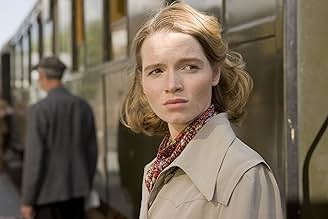Adicionar um enredo no seu idiomaIn the days leading up to the 1936 Olympics, the fate of high jumper Gretel Bergmann hangs in the balance as it is decided whether or not a Jewish athlete can be a part of the German Olympic... Ler tudoIn the days leading up to the 1936 Olympics, the fate of high jumper Gretel Bergmann hangs in the balance as it is decided whether or not a Jewish athlete can be a part of the German Olympic team.In the days leading up to the 1936 Olympics, the fate of high jumper Gretel Bergmann hangs in the balance as it is decided whether or not a Jewish athlete can be a part of the German Olympic team.
- Prêmios
- 2 vitórias e 1 indicação no total
Enredo
Você sabia?
- CuriosidadesSome of the newsreel footage shown in a theatre during the Games is actually from Leni Riefenstahl's documentary film "Olympia", which was not released until 1938.
- Erros de gravaçãoIn real iife, "Marie" was actually Intersex and had been raised as a girl. He was legally declared to be a man by a German court, and his first name was changed to Hermann. He was also permanently barred from sports and his records and medal were stricken.
- ConexõesReferenced in La noche de...: La noche de... Berlin 36 (2019)
Avaliação em destaque
We live in an unfair world, and we know it. In fact, we are already so sanitised by this that nothing much surprises us anymore. Not people who pretend to be nice to you while harbouring thoughts of how to make use of you to their advantage. Not people who put up a front to appear professional while conniving on how to take charge of the situation. No, not even the glory of sportsmanship inspires us anymore. Which is why we are not particularly taken aback that something this unthinkable happened in history – that sportsmanship was manipulated by the state to serve certain political agenda. And mind you, this happened some 74 years ago.
Such is the darkness behind the glory of the Olympic spirit.
The year is 1936, and the great and mighty Americans are putting pressure on the Germans because of their refusal to allow Jews on their Olympic team. They will boycott the Olympic Games if the Nazis do not lift that ban, especially in the case of high jumper Gretel Bergmann. The Nazis eventually allowed the poor girl (who migrated to Britain and became a champion there) to come home, but sneakily sent a rival Marie Ketteler to upset the situation. A friendship between the two athletes and before anyone knows it, a tension that could upset a nation's glory is formed.
Karoline Herfurth plays the Jewish athlete Bergmann (you can tell when she doesn't shout "Hail Hitler" like the rest of the characters) with conviction, and the indomitable spirit shines from her commendable performance. Looking comfortable in both sports and civilian outfits, Herfurth exudes a certain class and charm that we have not seen on the big screen for a while. Meanwhile, Sebastian Urzendowsky plays her teammate Ketteler who is, well, no point trying to hide here – a man. He has the looks and built of a fine young man, but somehow the filmmakers managed to portray a "woman" who is torn between the truth and falsehood. Maybe it's "her" curly hair, maybe it's "her" somewhat sultry look, or maybe it's just "her" demeanour as a "lady", but we managed to continue watching all 107 minutes of the movie thinking that "she" is one of the girls.
What seems to be a predictable storyline turns out to be a multifaceted display of human emotions (thanks to the all rounded and competent performances of the cast), where the most basic human feelings of pride, honour, humility and respect are exhibited through the characters' objectives and motives. There is always a looming feeling of dread as the film proceeds, as you fear something ominous for our heroine who deserves so much more than being chucked aside due to political reasons.
But history has already inked its place in time, and what already took place cannot be reversed. Some may call it a lesson of survival, some may call it a reminder of what cultural and historical conflicts can bring about, while some others may call it a tale of human instincts. So when the 96 year old Gretel Bergmann appears at the end of the film for an interview on the rather unfortunate incident that happened 74 years ago, you may just forget the unfairness of the world dishes to us, and feel the real human emotions that are genuine and heartening.
Such is the darkness behind the glory of the Olympic spirit.
The year is 1936, and the great and mighty Americans are putting pressure on the Germans because of their refusal to allow Jews on their Olympic team. They will boycott the Olympic Games if the Nazis do not lift that ban, especially in the case of high jumper Gretel Bergmann. The Nazis eventually allowed the poor girl (who migrated to Britain and became a champion there) to come home, but sneakily sent a rival Marie Ketteler to upset the situation. A friendship between the two athletes and before anyone knows it, a tension that could upset a nation's glory is formed.
Karoline Herfurth plays the Jewish athlete Bergmann (you can tell when she doesn't shout "Hail Hitler" like the rest of the characters) with conviction, and the indomitable spirit shines from her commendable performance. Looking comfortable in both sports and civilian outfits, Herfurth exudes a certain class and charm that we have not seen on the big screen for a while. Meanwhile, Sebastian Urzendowsky plays her teammate Ketteler who is, well, no point trying to hide here – a man. He has the looks and built of a fine young man, but somehow the filmmakers managed to portray a "woman" who is torn between the truth and falsehood. Maybe it's "her" curly hair, maybe it's "her" somewhat sultry look, or maybe it's just "her" demeanour as a "lady", but we managed to continue watching all 107 minutes of the movie thinking that "she" is one of the girls.
What seems to be a predictable storyline turns out to be a multifaceted display of human emotions (thanks to the all rounded and competent performances of the cast), where the most basic human feelings of pride, honour, humility and respect are exhibited through the characters' objectives and motives. There is always a looming feeling of dread as the film proceeds, as you fear something ominous for our heroine who deserves so much more than being chucked aside due to political reasons.
But history has already inked its place in time, and what already took place cannot be reversed. Some may call it a lesson of survival, some may call it a reminder of what cultural and historical conflicts can bring about, while some others may call it a tale of human instincts. So when the 96 year old Gretel Bergmann appears at the end of the film for an interview on the rather unfortunate incident that happened 74 years ago, you may just forget the unfairness of the world dishes to us, and feel the real human emotions that are genuine and heartening.
- moviexclusive
- 8 de ago. de 2010
- Link permanente
Principais escolhas
Faça login para avaliar e ver a lista de recomendações personalizadas
Detalhes
Bilheteria
- Faturamento bruto mundial
- US$ 354.980
Contribua para esta página
Sugerir uma alteração ou adicionar conteúdo ausente






























